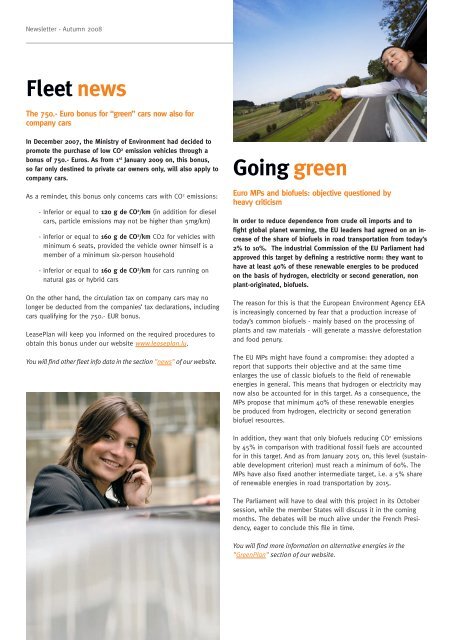Editorial - LeasePlan
Editorial - LeasePlan
Editorial - LeasePlan
Create successful ePaper yourself
Turn your PDF publications into a flip-book with our unique Google optimized e-Paper software.
Newsletter - Autumn 2008<br />
Fleet news<br />
The 750.- Euro bonus for “green” cars now also for<br />
company cars<br />
In December 2007, the Ministry of Environment had decided to<br />
promote the purchase of low CO 2 emission vehicles through a<br />
bonus of 750.- Euros. As from 1 st January 2009 on, this bonus,<br />
so far only destined to private car owners only, will also apply to<br />
company cars.<br />
As a reminder, this bonus only concerns cars with CO 2 emissions:<br />
- Inferior or equal to 120 g de CO 2 /km (in addition for diesel<br />
cars, particle emissions may not be higher than 5mg/km)<br />
- inferior or equal to 160 g de CO 2 /km CO2 for vehicles with<br />
minimum 6 seats, provided the vehicle owner himself is a<br />
member of a minimum six-person household<br />
- inferior or equal to 160 g de CO 2 /km for cars running on<br />
natural gas or hybrid cars<br />
On the other hand, the circulation tax on company cars may no<br />
longer be deducted from the companies’ tax declarations, including<br />
cars qualifying for the 750.- EUR bonus.<br />
<strong>LeasePlan</strong> will keep you informed on the required procedures to<br />
obtain this bonus under our website www.leaseplan.lu.<br />
You will find other fleet info data in the section ”news” of our website.<br />
Going green<br />
Euro MPs and biofuels: objective questioned by<br />
heavy criticism<br />
In order to reduce dependence from crude oil imports and to<br />
fight global planet warming, the EU leaders had agreed on an increase<br />
of the share of biofuels in road transportation from today’s<br />
2% to 10%. The industrial Commission of the EU Parliament had<br />
approved this target by defining a restrictive norm: they want to<br />
have at least 40% of these renewable energies to be produced<br />
on the basis of hydrogen, electricity or second generation, non<br />
plant-originated, biofuels.<br />
The reason for this is that the European Environment Agency EEA<br />
is increasingly concerned by fear that a production increase of<br />
today’s common biofuels - mainly based on the processing of<br />
plants and raw materials - will generate a massive deforestation<br />
and food penury.<br />
The EU MPs might have found a compromise: they adopted a<br />
report that supports their objective and at the same time<br />
enlarges the use of classic biofuels to the field of renewable<br />
energies in general. This means that hydrogen or electricity may<br />
now also be accounted for in this target. As a consequence, the<br />
MPs propose that minimum 40% of these renewable energies<br />
be produced from hydrogen, electricity or second generation<br />
biofuel resources.<br />
In addition, they want that only biofuels reducing CO 2 emissions<br />
by 45% in comparison with traditional fossil fuels are accounted<br />
for in this target. And as from January 2015 on, this level (sustainable<br />
development criterion) must reach a minimum of 60%. The<br />
MPs have also fixed another intermediate target, i.e. a 5% share<br />
of renewable energies in road transportation by 2015.<br />
The Parliament will have to deal with this project in its October<br />
session, while the member States will discuss it in the coming<br />
months. The debates will be much alive under the French Presidency,<br />
eager to conclude this file in time.<br />
You will find more information on alternative energies in the<br />
”GreenPlan” section of our website.


